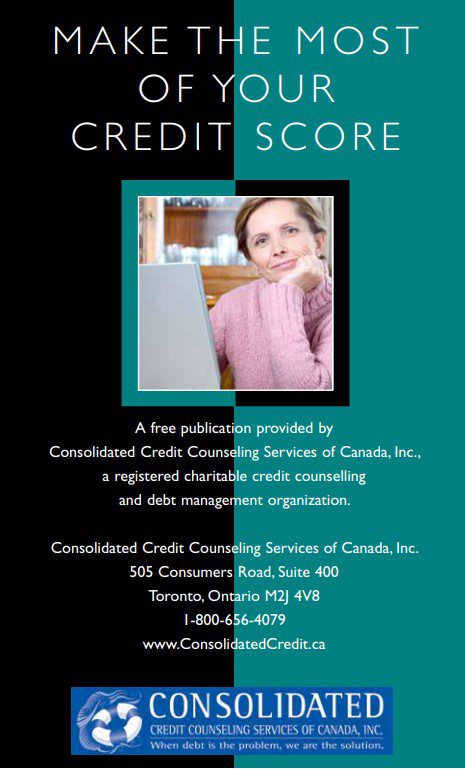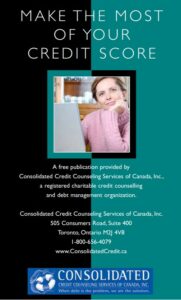
Make the Most of Your Credit Score
This publication is designed to demystify the credit scoring process. Credit scores can change frequently as information is updated in credit reports. Lenders may use different credit scoring formulas that are customized for their loan products. Additionally, this booklet has been formatted as an animated online interactive module that includes participant testing.

Congratulations on taking this important step to a brighter financial future. Consolidated Credit Canada has been helping Canadians across the country solve their credit and debt problems for years.
Our Educational Team has created over twenty-five publications to help you improve your personal finances. By logging onto www.consolidatedcreditcanada.ca you can access all of our publications free of charge. We have tools to help you become debt-free, use your money wisely, plan for the future, and build wealth. The topics Consolidated Credit Canada addresses range from identity theft to building a better credit rating; from how to buy a home to paying for university. On our website, you will also find interactive tools that allow you to calculate your debt and see how much it is costing you.
We are dedicated to personal financial literacy and providing a debt-free life for Canadians. If you are overburdened by high-interest rate credit card debt, then I invite you to speak with one of our trained counsellors free of charge by calling (844)-402-3073 for free professional advice.
Sincerely,
Jeffrey Schwartz
Executive Director
Consolidated Credit Canada.
Make The Most Of Your Credit Score
What is a Credit Score?
A credit score is a formula that is used to predict risk for lenders. To create a credit score, analysts may use information in credit reports, account histories, or applications. Their goal is to accurately identify the commonality of your timely paid accounts, as well as your delinquent accounts. The results of all
this computing and analyzing is a number that is your credit score.
Lenders use credit scores to help decide whether to issue a new account or loan, raise the credit limit on an existing account or even decide what interest rate to charge on a new or existing loan.
There are different types of scores, though many of them are developed by Fair, Isaac and Company, Inc. These are commonly referred to as “FICO scores.”
It’s important to understand that your credit score is never a single number. It can vary, depending on which of the two major credit bureaus supplied the credit information used to calculate it, what kind of loan is being considered, and what formula the individual lender uses to calculate it. For example, mortgage lenders typically will request copies of both of your credit reports (TransUnion and Equifax) and use a combination of the two reports to determine a score for you.
Your “FICO” score appears on your credit report and is determined by several different factors that also appear on your credit report. The number of credit inquiries you have, the number of balances on your accounts, and your payment history are all factors that influence your “FICO score.
Keep In Mind:
• Your credit score can change frequently as information is updated in your credit reports.
• Lenders may use different credit scoring formulas customized for their loan products when calculating your score.
• Credit scores are calculated using the information in your credit report, even if that information is not correct.
What’s In A Credit Score?
According to Fair Isaac Co, there are five categories of factors that go into your credit:
Payment History 35%
Amounts You Owe 30%
Length of Credit History 15%
New Credit 10%
Type of Credit In Use 10%
The two most important factors that go into your credit score are your payment history (have you paid your bills on time?) and the amounts you owe (how much debt do you carry?).
Together, these categories make up about two-thirds of your credit score. That means that if you want to improve your credit score you should focus on paying your bills on time and paying down debt.
How Can I Get My Credit Score?
You can typically purchase a credit score when you order your credit report, either through one of the major credit bureaus or through an online service that sells credit reports to consumers. You can also obtain a free credit report through www.equifax.ca or www.transunion.ca.
It’s an excellent idea to check your credit report and score at least six weeks before a major purchase such as a home or car, to give yourself time to correct any mistakes or problems.
How Long Will Negative Information Hurt My Credit Score?
The answer to this question can vary slightly according to the province that you live in. Below is general information to give you an idea. For details specific to your province, visit the Financial Consumer Agency of Canada’s website at www.fcac-acfc.gc.ca.
• Late payments can typically stay on your credit report for seven and a half years.
• Collection accounts and charge-offs can be reported for seven and a half years from the date you first fell behind leading up to the collection account or charge-off.
• Bankruptcies may be reported for up to ten years from the date of filing.
Keep in Mind:
• The older negative information becomes, the less of an impact it may have on your score
• New positive credit references can help improve your score, even if your credit report still contains negative information. That’s why it is important if you’ve had credit problems in the past, to establish positive credit references to boost your credit score. That does not mean you should carry debt. If you can’t qualify for a regular credit card, for example, you may be able to get a secured MasterCard or Visa card, which requires a security deposit. Use it from time to time for purchases, you would make anyway and then pay the bill in full to avoid interest charges.
How Much Can A Poor Credit Score Cost?
Your credit score will likely be a factor in the interest rate you are charged for loans. Here’s an example:
Total Interest on a 4-Year Auto Loan for $20,000
Excellent Credit Score (720-850): $2,128
Poor Credit Score (590-624): $6,919
In this example, the difference between an excellent credit score and a poor one is $4,791 in interest!
Should I Close Old Accounts?
Many consumers who review their credit reports find old credit card accounts they haven’t used for years still listed as open accounts. You may think it’s a good idea to close those accounts and have them listed on your credit report as closed. That’s not necessarily the case. Fair Isaac Co. says that closing old accounts can’t help your FICO credit score, and can only hurt it. Why?
Credit scores are based on information about how you’ve handled different types of credit over time. When you close out a lot of accounts, you may limit some of the information that could be helpful in predicting how you’ll pay in the future. You may also shorten the average length of your credit history. When it comes to credit scores, longer credit history is better.
Unless you have a specific reason for closing accounts — you’re getting divorced for example, and want to close your joint accounts – you may want to leave your old accounts as they are.
Credit Inquiries
Anytime a lender, creditor or employer checks your credit report, an inquiry is created. Although the number of recent inquiries is not a major factor in a credit score, too many inquiries in the last six months to a year can negatively impact your score so it’s best to avoid applying frequently for new credit.
The following types of inquiries do not hurt your credit score:
• Consumer-initiated inquiries, which occur when you order your own credit report or score.
• Promotional inquiries, which are created when your file is reviewed for a pre-approved credit card or line of credit.
• Employment or insurance-related inquiries.
To avoid penalizing customers who shop for mortgages or car loans, inquiries for these types of loans within a short period of time are grouped together and often count as a single inquiry. There is no such buffer, however, for inquiries generated by applying for credit cards.
How Will Credit Counseling Affect My Credit Score?
Many people worry that their credit will be damaged if they enter a debt management program through a credit counselling service. In fact, their credit score may stay the same or actually improve if they successfully stick to the repayment plan. There are several reasons for this:
1. Fair Isaac Co., creator of the widely used FICO scores, does not consider the fact that a consumer is in a counselling program when calculating a credit score.
2. Many creditors will not report anything to the credit bureaus that indicate that an account is being repaid through a counselling agency.
3. Some creditors will “re-age” accounts that are behind when a consumer enters a counselling program and sticks with it for several months. That means the late payments immediately prior to beginning the counselling program may be removed.
4. By entering a credit counselling program you may avoid further late payments, credit problems and even bankruptcy – all of which can significantly hurt your credit.
5. If you successfully pay down your debt through a counselling program, your credit score can improve since the amount of debt you carry is one of the major factors in calculating a credit score.
A Warning: While you are paying your debts through a counselling agency, you still remain legally liable to the creditor for those payments. If the counselling agency pays creditors late or doesn’t pay them at all, your credit report will suffer. Choose a reputable counselling agency with a track record of paying creditors on time.
Looking for Comprehensive Educational Tools to Guide You to Financial Freedom?
Consolidated Credit Canada, Inc.’s Learning Centre is the place to go. Log on to www.consolidatedcreditcanda.ca and learn how to manage your money, credit, and personal finances while advancing through a series of interactive educational challenges and booklets.
www.consolidatedcreditcanada.ca will help you:
1. Clarify goals
2. Understand debt to income ratios
3. Prepare a spending plan
4. Get your credit report
5. Save money
6. Stop living paycheque to paycheque
About Consolidated Credit Canada
Consolidated Credit Canada is a consumer-oriented, non-profit organization. We are an industry leader in providing credit counselling and debt management services. Our mission is to assist individuals and families in ending financial crises and to help them solve money management problems through education, motivation, and professional counselling. Our organization is funded primarily through voluntary contributions from participating creditors. Our programs are designed to save our clients money and liquidate debts at an excellent rate.
We are dedicated to empowering consumers through educational programs that will influence them to refrain from overspending and abusing credit cards,
as well as to encourage them to save and invest. Regardless of whether your financial problems are due to the purchase of a new home, the birth of a child, major illness, or any other circumstance, we can help.
* If you are headed for a debt disaster visit www.ConsolidatedCreditCanada.ca or call (844)-402-3073 for free professional advice by a trained counsellor.




